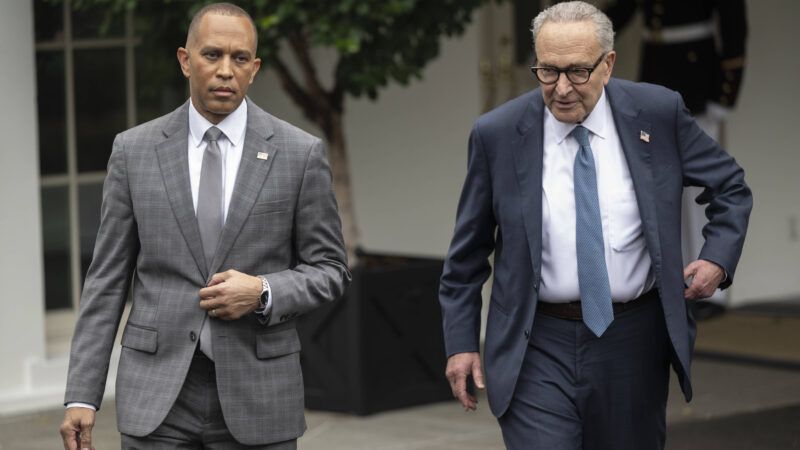Democrats Shut Down the Government to Obscure Obamacare's Failures
The fight over whether to extend "temporary" health insurance subsidies is really a fight over how best to hide the costs created by the Affordable Care Act.

Milton Friedman liked to quip that there's nothing more permanent than a temporary government program.
We're seeing more evidence for this adage as the government shut downs following Democrats' refusal to vote for a spending bill that did not include an extension of "temporary" Affordable Care Act (ACA), aka Obamacare, subsidies passed during the pandemic.
Those enhanced subsidies were passed as a temporary measure as part of the $1.9 trillion American Rescue Plan Act in March 2021, and then extended through the end of 2025 by the so-called Inflation Reduction Act (IRA).
Obamacare always provided subsidies for individuals to purchase insurance plans on ACA marketplaces set up by the law. The 2021 Act passed enhanced subsidies eliminated the income eligibility caps for those subsidies and also made them more generous for current recipients.
Making these subsidies permanent would not be cheap. The Congressional Budget Office estimates that it would cost $340 billion a year.
On the flip side, letting the tax credits expire would result in about 1.6 million higher-income earners losing subsidies completely. Millions more would continue receiving a smaller subsidy and see their premiums rise as a result.
With their sunsetting deadline approaching and their votes necessary in the Senate to pass a spending bill, Democrats attempted to use what leverage they had to pass a more permanent extension of the "temporary" subsidies.
Republicans were not inherently opposed to extending four-year-old "temporary" subsidies, with some GOP lawmakers proposing to extend them by at least one year. But Republican leadership in the Senate insisted on funding the government first and then negotiating on health care subsidies.
With the federal government partially shuttered for the time being, both parties are now rolling out their well-worn attack lines. Democrats complain Republicans are trying to take away people's health care. Republicans say Democrats are trying to give health care to illegal immigrations.
That the expiration of "temporary" ACA tax credits resulted in a government shutdown shouldn't surprise anyone, says Michael Cannon, director of health policy studies at the Cato Institute.
"The fact that [the temporary subsidies] create a phony crisis every couple of years when they expire, from a political perspective, is a feature, not a bug. This is how spending grows," he says.
Democrats are particularly insistent on preserving subsidies that were pitched as a temporary COVID measure because they help hide the costs of Obamacare, he says.
The 2010 law required health insurance companies to cover certain "essential health benefits." It also forbade them from refusing to cover, or charging higher premiums to, people with more expensive medical conditions.
The twin effect of these mandates has been to raise premiums generally, particularly for healthier people. Ge Bei, a professor of accounting and health policy at Johns Hopkins University, notes in The Wall Street Journal that premiums have increased 80 percent since 2014, when the ACA went fully into effect.
The 2021 expansion of the ACA subsidies attempts to mask the cost of rising premiums by shifting more of the expense onto taxpayers as a whole.
Those expanded subsidies have been successful at reducing the cost of ACA individual plans, for policyholders at least if not for taxpayers.
The health policy research outfit KFF says that since the enhanced subsidies were passed, enrollment in the ACA marketplace plans has increased from 11 million to 24 million, the vast majority of whom are benefiting from the post-2021 subsidy enhancements.
Cannon says the increased post-2021 enrollment in Obamacare marketplace plans merely shows how unpopular the insurance products created by the law really are.
Only through extensive subsidization of high-income earners are people willing to participate in ACA marketplaces.
Without the subsidies, many people would simply not purchase the high-cost ACA marketplace plans. (The penalty for not purchasing health insurance was zeroed out in 2019.)
The CBO says extending the subsidies will lead to nearly 3.8 million more insured people by 2035. KFF estimates that ACA marketplace premiums would more than double if the expanded subsidies were allowed to lapse.
The immediate increase in policyholders' premiums helps explain why Democrats felt this was an issue they could get political mileage out of during a shutdown fight. It also explains why plenty of Republicans are willing to negotiate on yet another extension of "temporary" enhanced subsidies to prop up a law the party uniformly opposed when it was passed.
Cannon, in contrast, says the subsidies should be allowed to lapse. That would force policymakers to actually deal with the regulations driving up the cost of health insurance premiums, as opposed to just hiding the cost in the federal budget.
"Everything in U.S. health care is a fiscal illusion. They want to keep hiding the cost of Obamacare's health insurance regulations," says Cannon.
